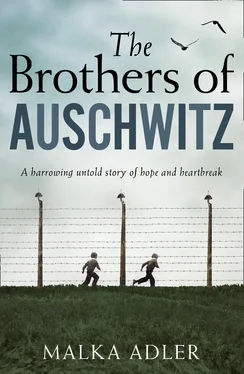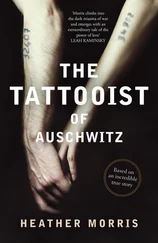The German with the white gloves took us to Bloc 8. Things were good for us in Bloc 8. Food on time. Lights out. A shower every day. Beds with blankets, clean sheets. A place with discipline and the color white. Fifty or sixty children with Baba – Uncle Volodya in charge. A fat man with a fat nose and a fat voice, and a large handkerchief in his hand. He liked to travel with his handkerchief on his bald head, pat-pat-pat-pat, but also to wipe children’s tears with it. It was mainly at night that he wiped and fondled everywhere. I was quiet, almost unmoving, when he wiped and fondled. I barely breathed and my mouth was closed.
A doctor came into the bloc every morning.
Doctor had alert ears like an antenna. Doctor said hello, how are you, children. Doctor laughed with white teeth, and I saw the slight tremor of the antenna. Doctor would choose a child and leave.
In the meantime, Baba Volodya fondled children. Baba Volodya pinched cheeks and sent kisses to the ceiling. Children jumped on Baba. Children hugged Baba. Children said thank you, Baba, thank you. Thank you for the good food. The clean sheets. The shower and hot water.
And I saw method: children who went with doctor didn’t return to the bloc. Their beds remained empty. I didn’t understand. Healthy children leave with doctor. Plump children leave the bloc. Children with color in their cheeks don’t come back to sleep in the bloc.
I hung onto Baba Volodya’s shoulder, asking him, where do the children go, Baba, and why don’t they come back to the bloc to sleep, what’s going on here, Baba, huh? Baba didn’t respond. I felt knives in my belly. I felt I had no air left at the open window. Every time the doctor came in I would catch Baba Volodya’s eye. Catch his eye and hold it. As if I were hanging onto his shoulder from a distance, as if telling him, you’re my father, you’re my father, and you won’t leave me alone like my first father, d’you hear me? Only when the doctor left did I leave Baba Volodya and breathe in from the deepest place possible.
I started wandering around, asking questions.
I walked the length of the bloc. And back again. I walked back and forth, counting. I asked, where do the children go, where, and got no answer. I went over to stand near the older prisoners. I knew they were old-timers by the numbers on their clothing and their silence. They neither asked nor answered, just stood there staring nowhere. I said, tell me, where do the doctor and the children go, where is that building?
One said, there’s a special place for experiments on young ones and a place for experiments on grownups. Doctor and child go to a place for experiments on young ones.
I said, experiments, what are experiments, what do you mean, tell me, I don’t understand. He had an eye infection that leaked like a slug.
He looked at me without seeing me, as if thinking about me, then, finally, he said, go away, boy. My blood pounded fast in my veins, tam-tam, tam-tam. Someone else with a swollen belly who had heard me stuck to me. My blood pounded even faster.
My new friend said, be careful. I don’t go anywhere near that place. Every child goes into a pot with gas, they close the lid on his head, like with soup. There are other cases. They examine some children according to a clock: how long can they live without air. Some last for a long time, others not at all. They die the minute the clock is set.
I stamped my foot and ran back to the bloc. I grabbed a freckled boy by the neck, calling agitatedly, boy, wait. What does it mean when the doctor leaves with a boy and returns without. Tell me, is it true they cook him in a pot? Cut him?
The boy said, don’t know, and ran away as if I were holding a butcher’s knife. I didn’t give up. I ran outside. I caught a short prisoner with saliva on his chin.
Asked, what are experiments, and why do healthy children leave beds empty, huh?
He asked, where.
I muttered, in Bloc 8.
He sat down, are you in that bloc?
I hit him on the shoulder. Shouted, tell me, now, what’s going on in my bloc.
He rolled his tongue and said, they inject a needle with a substance into the boy’s vein, but first they talk to him nicely. Then they measure how long it takes for the substance to reach the heart. For some it takes three minutes. For others one minute. For some even less. But you should know it doesn’t hurt to die like that. They die well there, without a nasty smell.
I asked who talks such nonsense, the one who dies?
The man said, no. Not the one who dies, and he wanted to go.
I tugged at his shirt, the doctor says so?
No.
So who says it doesn’t hurt, who? The prisoner turned and walked off.
I decided to escape from Bloc 8.
I heard they were looking for a cook for the women’s camp. I told Baba Volodya I’m a very good cook. Get me out of here into the women’s camp. Get me out, Baba, please. As if I were your boy now. Baba Volodya stuck a match between his teeth and pressed hard. I didn’t move from him. Volodya wrote down my name.
Volodya said, wait. I waited. I watched him from wherever I stood. I pursued him and waited.
Achtung. Achtung . 55484, report.
My heart stopped. I didn’t know where they were sending me, to the gas chamber of the Jews, the experiments’ pot, or to cook in the women’s camp. Gas. Kitchen. Pot. Gas. Kitchen. Pot. Kitchen. Kitchen. My tongue went dry in moment. I felt a strong pain in my backside. I went out.
Soldiers took me to a petrol station. Soldiers put me on a train car. I moved from Buchenwald to Camp Zeiss. An entire day on a cattle train.
Dov: Do you remember when they took us from home to Ungvár,
we sat in open cattle cars and heard train whistles?
Yitzhak: Remember.
Dov: Do you remember our rabbi saying, when the Messiah
comes, you’ll hear a shofar?
Yitzhak: Nu?
Dov: When I heard the whistle, I thought,
maybe our rabbi was right, maybe the Messiah did come.
Yitzhak: Nobody came to save us. Nobody.
At Auschwitz, in 1944, a number was tattooed on my arm, A-4092.
“A” signified a transport from Hungary. The next day they made us stand to attention for eight hours on the parade ground. The rain didn’t stop falling. I was cold. Cold. Cold. I had gooseflesh like pinheads on my skin. I felt as if they’d stuck a board in my back. In my shoulders. My legs trembled rapidly, rapidly, slowly. Rapidly, rapidly, snap. The muscle jumped. I was sure everyone could see.
SSman yelled, Do Not Move. Do Not Sit. I grabbed my trousers and pushed the fabric forward.
Anyone who fell did not get up.
Prisoners usually fell quietly. Sometimes they’d cheep like chicks in a nest. Sometimes I’d hear a blow, thwack, and that was that. Prisoners with a function had stripes and a ribbon on the arm and they’d drag the fallen out of the row. I focused my gaze on the nearest wall. I saw black circles running along the parade ground. The circles brought prickles to the temples and shoulders, two-three minutes and the prickles settled in the legs. Suddenly, hot. Hotter. And that was that. I couldn’t feel my legs. Like paralysis. In my shoulders and neck as well.
They announced numbers over the loudspeaker. The voice over the loudspeaker was cheerful. As if he had a few chores to finish before going home, la-la-la. A prisoner next to me, an older man, began to cry quietly.
I heard him say Sh’ma Yisra-el Adonai Eloheinu Adonai Echad – Hear, O Israel, the Lord is our God, the Lord is One and immediately fall. He had white foam on his lips. He made the mewling sound of a cat kicked by a boot. Within seconds he was dragged out. Vanished. Poor man, poor man, God didn’t hear him. I wanted to scream, where are you. God didn’t answer. He cut me off too. I gave myself an order, stand straight, Dov, don’t move, huh. I heard my number over the loudspeaker. I went with other prisoners. They sent us to work at Camp “Canada,” named for the belongings left on the platforms by prisoners from the trains. They called us “Canada” Commando. They put me in a huge storeroom and told me to sort out clothes. There was a huge pile in the storeroom. Like a colorful hill of sand. There were suitcases. Many many suitcases with a number, or a name, or a label tied on with string. Sometimes, just a small ribbon on a handle, a red or green ribbon, like the ones used to arrange little girls’ hair.
Читать дальше












